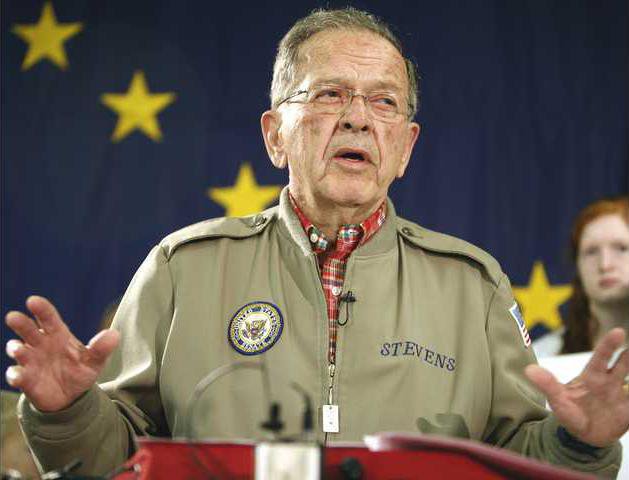JUNEAU, Alaska - A plane carrying former Sen. Ted Stevens and ex-NASA chief Sean O'Keefe crashed near a remote fishing village in Alaska, killing the longtime senator and at least four others, authorities said Tuesday.
The crash was a stunning event in a state where Stevens became the most beloved political figure in Alaska history during his 40 years in the Senate, earning a reputation as a tireless advocate for projects that brought millions of federal dollars to the state. He was 86.
Stevens and O'Keefe are longtime fishing buddies who had been planning a trip near where the float plane crashed while carrying nine passengers. Shannon O'Keefe said her brother and his son were on the plane, but their status was not immediately known.
Rescuers arrived on helicopter early Tuesday and were giving medical care to at least three survivors, Alaska National Guard spokesman Maj. Guy Hayes said. He offered no additional details about their conditions or identities.
National Transportation Safety Board spokesman Ted Lopatkiewicz told The Associated Press in Washington that "it appears that there are five fatalities." He said the NTSB is sending a team to the crash site outside Dillingham, located in Bristol Bay about 325 miles southwest of Anchorage. The aircraft is a DeHavilland DHC-3T registered to Anchorage-based GCI.
The cause of the crash was not immediately known, but the flights at Dillingham are often perilous through the mountains, even in good weather.
Federal Aviation Administration spokesman Mike Fergus said the plane took off at 2 p.m. Monday from a GCI corporate site on Lake Nerka, heading to the Agulowak Lodge on Lake Aleknagik.
The lodge is made of logs and sits on a lake, and photos show a stately main lodge room with a large imposing stone fireplace, a leather sofa and a mounted caribou head on the wall.
Fergus said the plane was flying by visual flight rules, and was not required to file a flight plan.
Hayes said the Guard was called to the area about 20 miles north of Dillingham around 7 p.m. Monday after a passing aircraft saw the downed plane. But severe weather has hampered search and rescue efforts.
The National Weather Service reported rain and fog, with low clouds and limited visibility early Tuesday. Conditions ranged from visibility of about 10 miles reported at Dillingham shortly before 7 p.m. Monday to 3 miles, with rain and fog later.
At least three crash victims were being airlifted to Anchorage, Guard spokeswoman Kalei Brooks Rupp said. She said volunteers hiked into the crash site Monday night and provided medical aid until rescuers arrived.
Stevens was appointed to the Senate in 1968 and served longer than any other Republican in history. He was revered as a relentless advocate for Alaska's economic interests.
Stevens was one of two survivors in a 1978 plane crash at Anchorage International Airport that killed his wife, Ann, and several others. He remarried several years after the crash - he and his second wife, Catherine, have a daughter, Lily.
The airport in Anchorage is now named after Stevens.
"Last night, Alaska lost a hero and I lost a dear friend," Alaska Sen. Lisa Murkowski said in a statement. "His entire life was dedicated to public service from his days as a pilot in World War II to his four decades of service in the United States Senate. He truly was the greatest of the Greatest Generation."
Over the years, Stevens directed billions of dollars to Alaska.
But one of his projects - infamously known as the "Bridge to Nowhere" - became a symbol of pork-barrel spending in Congress and a target of taxpayer groups who challenged a $450 million appropriation for bridge construction in Ketchikan.
Stevens' standing in Alaska was toppled by corruption allegations and a federal trial in 2008. He was convicted of all seven counts - and narrowly lost his Senate seat to Democrat Mark Begich in the election the following week.
But five months after the election, Attorney General Eric Holder sought to dismiss the indictment against Stevens and not proceed with a new trial because of prosecutorial misconduct by federal prosecutors.
Plane crashes in Alaska are somewhat common because of the treacherous weather and mountainous terrain. Many parts of the state are not accessible by roads, forcing people to travel by air to reach their destinations.
Begich's father, Nick Begich, who was Alaska's only congressman in 1972, was killed when his plane disappeared over the Gulf of Alaska with then-House Majority Leader Hale Boggs of Louisiana.
The Stevens crash is the latest in a long line of aviation accidents to claim political figures over the years in the U.S., including Pennsylvania Sen. John Heinz in 1991, South Dakota Gov. George Mickelson in 1993, Missouri Gov. Mel Carnahan in 2000 and Minnesota Sen. Paul Wellstone in 2002.
O'Keefe, 54, was NASA administrator for three tumultuous years. He was deputy director of the Office of Management and Budget when President George W. Bush asked him in late 2001 to head NASA and help bring soaring space station costs under control.
But budget-cutting became secondary when the shuttle Columbia broke apart during re-entry in 2003.
O'Keefe's most controversial action at NASA was when he decided to cancel one last repair mission by astronauts to the Hubble Space Telescope. He said the mission was too risky. His successor overturned the decision. The Hubble mission was carried out last year.
O'Keefe left NASA in 2005 to become chancellor of Louisiana State University. He is now the CEO of defense contractor EADS North America and oversees the bid for the hotly contested Air Force refueling jet contract.
The contract competition, which pits EADS against rival plane maker Boeing Co., is for a piece of what could eventually be $100 billion worth of work replacing the military's fleet of aging tankers.
"No matter what, our thoughts and prayers are going out to anyone who might be on that flight," Shannon O'Keefe said.

